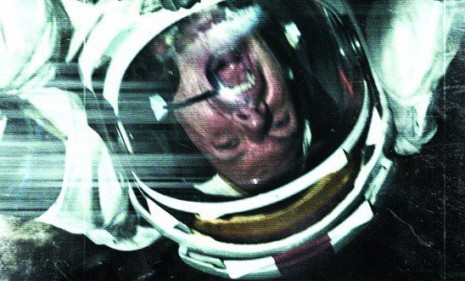NASA vs. Apollo 18
The space agency is none too thrilled about the new sci-fi thriller's many conspiracy theories — or its attempt to pass off a fictional moon voyage as real

A free daily email with the biggest news stories of the day – and the best features from TheWeek.com
You are now subscribed
Your newsletter sign-up was successful
Countless movies are set in outer space, and NASA — always happy to promote space exploration as dramatic and crucial — often collaborates behind the scenes with starry-eyed filmmakers. But the space agency is intentionally distancing itself from Apollo 18, a new movie opening this weekend that tells the story of a (fictional) ill-fated mission to the moon and a subsequent government conspiracy to cover it up. Here's what you need to know:
What is Apollo 18 about?
"Officially, Apollo 17 was NASA's final manned mission to the moon," the film's trailer says. (Watch it here.) The trailer goes on to assert "unconfirmed intelligence of an 18th mission." The sci-fi thriller, shot like a documentary and released by the Weinstein Co., tells the imagined story of such a hush-hush mission. "To recap: Evidence of a vast, 40-year government conspiracy is allegedly about to be exposed by the movie studio that brought you Piranha 3D and Scream 4, says Rebecca Keegan in the Los Angeles Times.
The Week
Escape your echo chamber. Get the facts behind the news, plus analysis from multiple perspectives.

Sign up for The Week's Free Newsletters
From our morning news briefing to a weekly Good News Newsletter, get the best of The Week delivered directly to your inbox.
From our morning news briefing to a weekly Good News Newsletter, get the best of The Week delivered directly to your inbox.
But everyone knows the film is fiction, right?
Not necessarily. Taking a page from The Blair Witch Project playbook, the movie's P.R. masterminds have deliberately blurred fact and fiction. "What you are about to see is the actual footage which the astronauts captured on that mission," the Facebook page for the film reads. "While NASA denies its authenticity, others say it's the real reason we've never gone back to the moon."
What does NASA say?
Though the agency originally promoted its association with the film, it's since changed its tune, apparently miffed by the movie's marketing. "Apollo 18 is not a documentary," NASA's Bert Ulrich told the Los Angeles Times. "The film is a work of fiction, and we always knew that. We were minimally involved with this picture. We never even saw a rough cut. The idea of portraying the Apollo 18 mission as authentic is simply a marketing ploy."
A free daily email with the biggest news stories of the day – and the best features from TheWeek.com
Is this spat typical?
No. NASA collaborates on dozens of films and television shows each year — and usually, everyone gets along just fine. In 2010, NASA helped out on 100 documentaries, 16 feature films, and 35 TV shows. But sometimes, "attempts at collaboration break down," says Keegan. For instance, NASA refused to work with Warner Bros. on 2000's Red Planet, a Val Kilmer movie about humans trying to colonize Mars in the wake of ecological disaster on planet Earth. The movie's science was "so off the wall," says Ulrich, that it distorted the truth to an unacceptable degree.
What other movies has NASA consulted on?
A whole bunch: From tent-pole flicks like Transformers: Dark of the Moon to the polarizing indie The Tree of Life. I'm not sure I understand NASA's criteria for suitable films, says Christopher Campbell at IndieWire. "They cooperated with Peter Hyams' Capricorn One, for instance, and that was a thriller presenting the moon landing hoax theory as if it were true." Why that, but not Apollo 18?
Sources: Facebook, IndieWire, Los Angeles Times
-
 The ‘ravenous’ demand for Cornish minerals
The ‘ravenous’ demand for Cornish mineralsUnder the Radar Growing need for critical minerals to power tech has intensified ‘appetite’ for lithium, which could be a ‘huge boon’ for local economy
-
 Why are election experts taking Trump’s midterm threats seriously?
Why are election experts taking Trump’s midterm threats seriously?IN THE SPOTLIGHT As the president muses about polling place deployments and a centralized electoral system aimed at one-party control, lawmakers are taking this administration at its word
-
 ‘Restaurateurs have become millionaires’
‘Restaurateurs have become millionaires’Instant Opinion Opinion, comment and editorials of the day